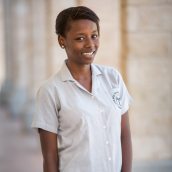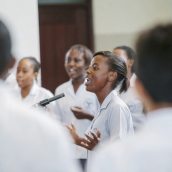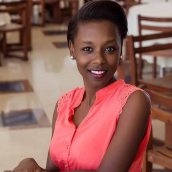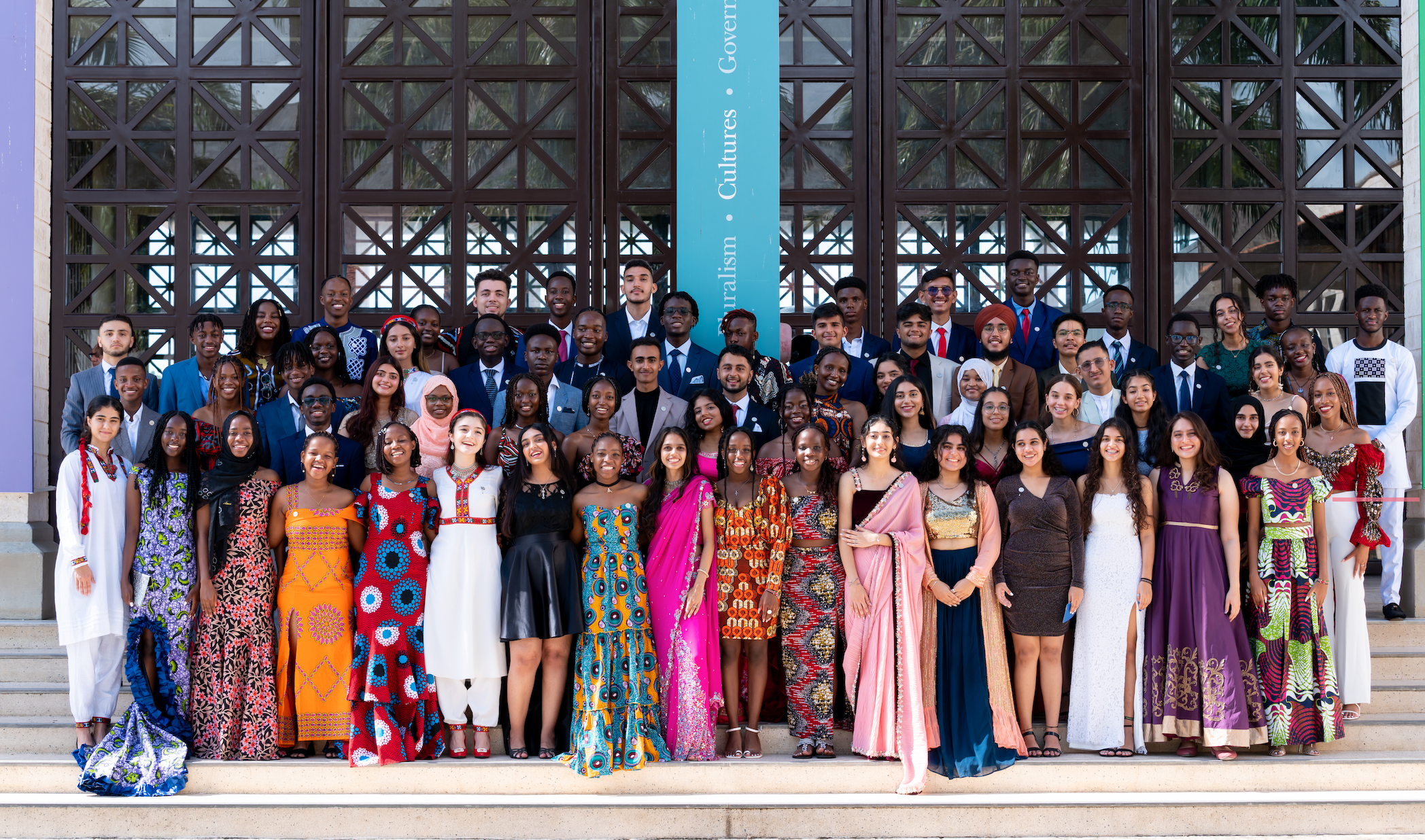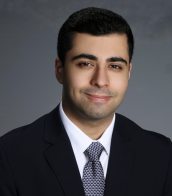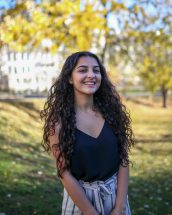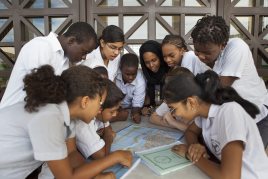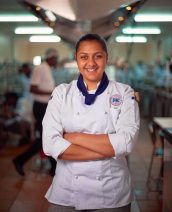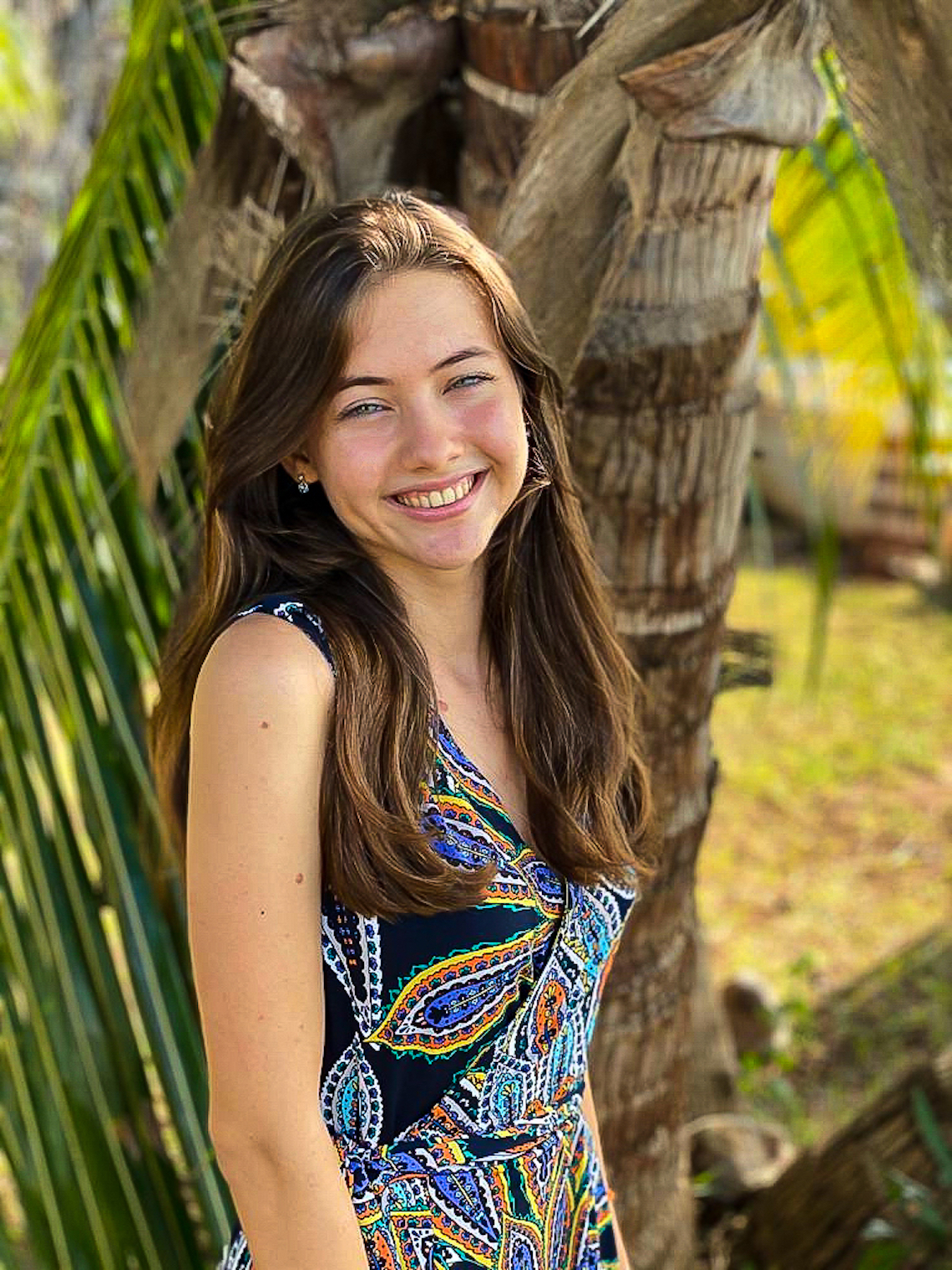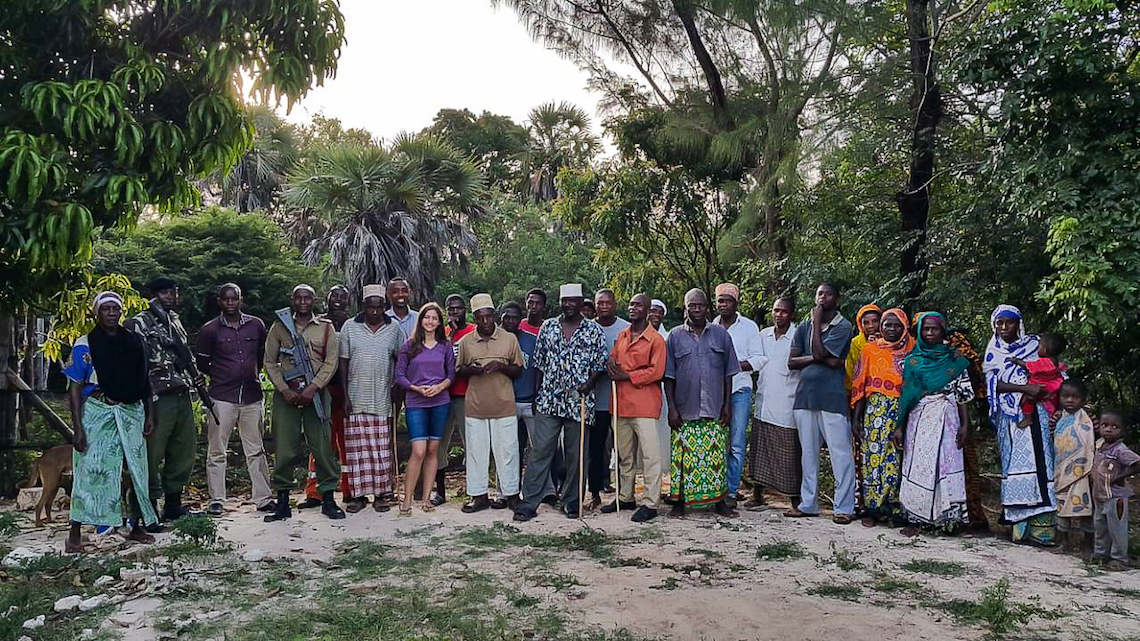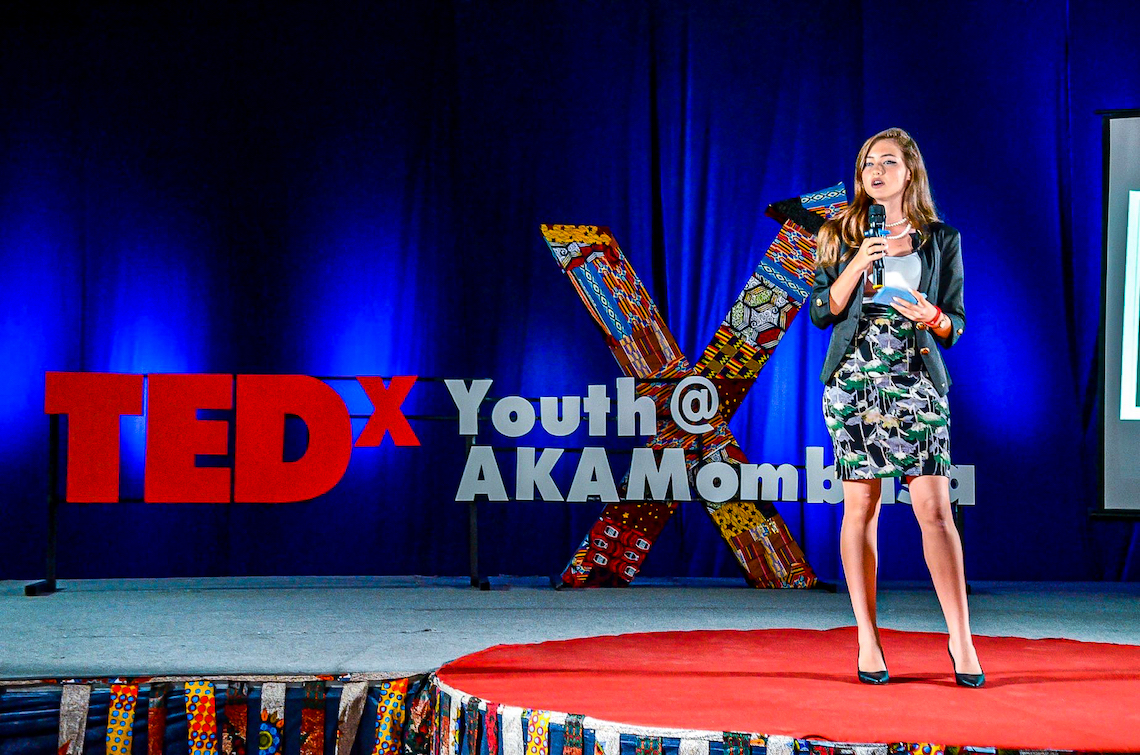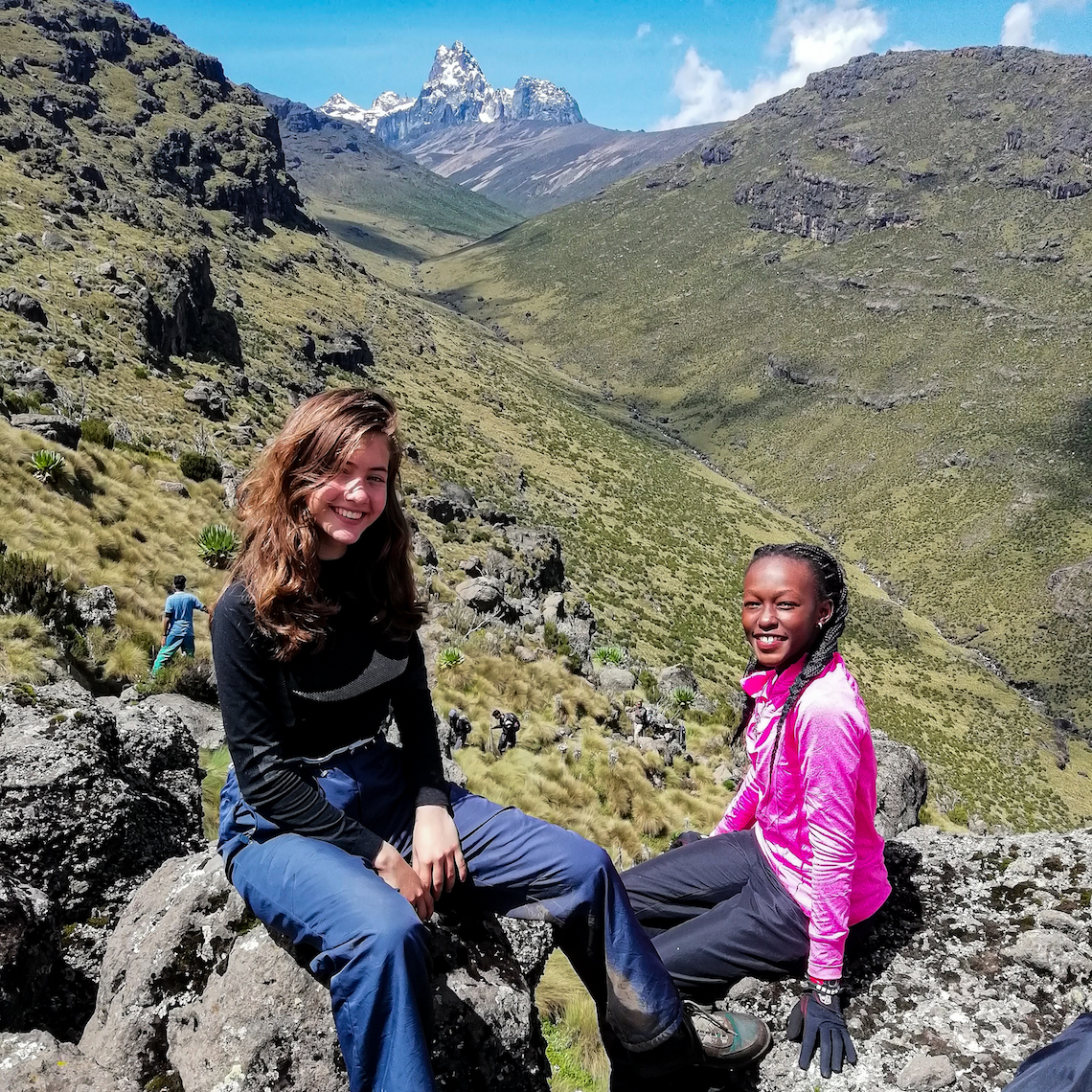At the Aga Khan Academy Mombasa, Ham Serunjogi – CEO and co-founder of African fintech giant Chipper Cash – realised the importance of staying connected to something larger than himself. The Forbes 30 Under 30 honouree is now serving as an advisor to the US President on African diaspora engagement.
Mary Favour (Class of 2015): Ambitions to build a better future
For a while, getting an education was a process for Mary Favour. She would rise early in the dark – at 4:00 am – and make the long trek to school on foot with her three siblings, arriving at around 6:30 am each day. By the time they returned home to Mombasa, it was 7:00 pm. The rest of the evening was spent helping their mother around the house and finishing their homework.
It wasn’t easy, Mary recalled.
“My sisters and I grew up with a single mother,” she said. And resources were tight.
When the electricity bill wasn’t paid, the Favour children would study under the dim glow of a kerosene lamp or by candlelight. The four siblings had limited school supplies and relied on Mary for many of their study materials.
“We got awarded books if we topped the class,” she explained. “Sometimes we’d get textbooks, other times we’d get storybooks or novels. It was an incentive that the teachers had to motivate students.”
A new opportunity at the Aga Khan Academy Mombasa
Despite the obstacles, Mary said her mother was determined for her to succeed. She pooled her resources to give Mary a much-needed laptop in grade 9. By then, things had begun to turn around – Mary had received a full scholarship to study and live at the Aga Khan Academy Mombasa as part of its Talent Identification Programme, a programme that provides students from more disadvantaged backgrounds the opportunity to attend the Academy on full scholarship. She would graduate in 2015 and go on to study at the University of Toronto in Canada, also on full scholarship.
Now a second-year student at university, Mary hasn’t forgotten her difficult upbringing or her roots. In fact, the struggle to get an education early on has instilled in her a strong desire to give back to her community and help others like her get a shot at a better life.
“Six years of growth, skill and a good education” at the Academy was “a gift,” Mary said. “I want to [give] a gift to someone else.”
In particular, she’s learned the importance of independence, humility and sacrifice – lessons she put to use during her Academy days.
Mary joined the Aga Khan Academy in 2009 as part of the first batch of students in the Talent Identification Programme. While there, she participated in a range of activities, including choir, soccer and debate, with the same level of perseverance her mother had taught her. She quickly excelled academically, becoming an honors student in grade 10, and also challenged herself in extracurriculars – musically in competitions and as the assistant captain of her hockey team.
Helping others through community service
Beyond this, Mary fostered a passion for community service and activism rooted in her desire to help outsiders fit in. She led the ‘Just Say No’ initiative, a programme focused on rehabilitating primary school girls in Mombasa who had turned to prostitution in large part to support their families financially.
She worked with these girls for three years, exposing them to the same opportunities she and other students had the privilege of in their own education, including sports and debate. She hosted workshops on public speaking and art, as well as sessions with counsellors and strong female mentors, and invited the girls to perform at the Academy’s talent competition.
“The aim was to help them feel integrated into society but at the same time equip them with skills that would make their education holistic,” Mary said. The mission was especially important, she said, because of the gender gap she saw in Mombasa’s primary schools and the way in which this unfair system contributed to larger problems down the line.
“That inequality creates an imbalance that marginalizes women in our society,” Mary said.
Under her leadership, the club received three awards and became one of the most successful student groups on campus.
Supporting other students to succeed
In addition, Mary founded the ‘I Know Who I Am’ initiative, a programme that integrates scholarship students like herself into the Academy community while understanding that they needed to “stay in touch with home and not forget their society,” as Mary explained.
“I wanted to celebrate the diversity that came with these students but at the same time make sure that they don’t lose themselves,” she said. So she ran workshops on pluralism and open-mindedness, ate food and played games the students would recognise from home and “held discussions on what it meant to be part of a community but remain true to yourself.”
In the summer of 2017, Mary interned with the Students for International Development. The non-profit organisation was founded and is run by students. While there, she worked with the Orphan Sponsorship Programme as project manager for about two months. Mary and her team focused on the Simboyi Primary School in Vihiga, in the west of Kenya. They were in charge of the remedial education project for orphans and also worked on projects to support students financially.
After conducting interviews with some of the students in Vihiga, Mary and her team developed a means by which to help them be better equipped to reach their full potential. According to Mary, a number of the students came from families that were struggling to make ends meet. Some, she recalled, told her they only had one meal per day, which usually consisted of just ugali or porridge. Others said they didn’t eat at all. Further, a number of those who performed well in class were unable to pay for their exams and had to sit them out instead.
With Mary’s help, the organisation created a scholarship to help these students. The award, which she said covers basic health care, one meal a day, a yearly uniform and exam fees, will be able to assist 55 students during the current academic year at Simboyi. The hope is that the sponsorships will continue into the next year if budget and fundraising allow.
Real-time results and change like this mean the world for Mary, not least because she knows firsthand what it’s like to have the academic situation and resources not in your favour.
“I was a child with big dreams and no way of actualising them until I joined the Academy,“ she said. “I want to be for someone else what the Academy was to me.”
Catalyzing change for a better future
Mary believes education is one of the best tools to rid our societies of poverty, and she’s determined to be in a position to support students so they have better paths forward at their disposal than what she had. That’s why she plans on returning to Kenya after she’s obtained the necessary experience and skillset to properly give back to her country and community.
Currently majoring in human geography and diaspora and transnational studies and minoring in African studies, Mary thinks that, through the study of cultures and international development, she can better understand how to bridge the gap between rich and poor at home. Her hope is to protect the rich cultural diversity of Kenya but also contribute to changing the country so that it is better able to develop and sustain itself and compete and interact on a global scale more effectively.
“Kenya is at such a pivotal moment in the making of African history,” she said. “It has so much potential. I just want her to maximize her potential. I want to help her do it.”
Mary is uniquely positioned to kickstart such a change at home. Her pluralistic perspective on the world and passion for country could be just what Kenyans need to motivate their leaders to be better and to take action to institute real change. And if her triumphs at the Academy are any indication, Mary’s motivation may just be contagious.
By Farah Mohamed
Samy Natho Jina: Using information technology to better the world
Samy Natho Jina is an International Baccalaureate (IB) Diploma Year 12 student at the Aga Khan Academy Mombasa. In addition to being an informed global citizen, Samy is a skilled and talented self-taught computer coder. Currently pursuing Information Technology in a Global Society at higher level as part of his IB Diploma, he strives to derive ways through which he can use information technology (IT) to create value in today’s society and tackle social and ethical issues. He says, “Building systems is not enough; for me, considering the impact on the stakeholder’s life is also a key factor.”
Samy’s passion for computers began on his sixth birthday when he received a “slow and old Acer laptop.” He says that because the laptop was too slow to play computer games, he used his time to explore the computer’s settings and discovered all the features that were being offered by Windows XP. As a result of his vivid curiosity and experimental nature, Samy unknowingly installed virus software which caused the computer to crash. Determined to fix his computer, Samy tried all the possible methods to restore it: he sought advice from many adults, attempted creative problem-solving techniques, and even visited a computer scientist to figure out what was happening.
Ultimately, Samy’s curiosity and determination led him to discover that this – dealing with computers and software – was what he wanted to do for a living in the future. Samy now aspires to develop his skills at university through studying software engineering and computer science.
Along with being a hardworking IB student, Samy is constantly working on new applications, coding new projects, and making apps for various companies. The first app he created was for his parents to help their pharmaceutical company handle online business management, archive files and track sales. He created another security software for a non-profit organisation for referencing and tracking individuals for an event. Samy also designed an advanced website for a TEDx event in Mombasa, Kenya where he added security and ticketing features. Samy comments, “As my understanding increases so does my passion.” An extremely driven individual, he also uses online platforms such as OpenClassrooms to learn coding languages like HTML5, CSS3, JavaScript, PHP5, jQuery and others, for which he has also gained many certificates. “With each new language I learn, I become more excited about that field,” Samy explains.
Samy believes that in five to 10 years, the whole world will depend more on information technology than it currently does today. He believes that there is a great future in developing modern technologies for medical applications, and wishes to be at the core of the technological development that will advance medical health applications. Samy believes in practical application along with theoretical learning and is working hard to bring about a positive change.
Samy is extremely grateful for the opportunities he has been granted to use his skills for the betterment of the local community with support from the encouraging environment at the Aga Khan Academy Mombasa. Samy says, “For each and every project, I have spent countless nights out of my own free will fixing incorrect lines of code. It is my dream to make sure this talent and passion I have for software development and computers can be used to make this world a better place.”
By Khushboo Shah
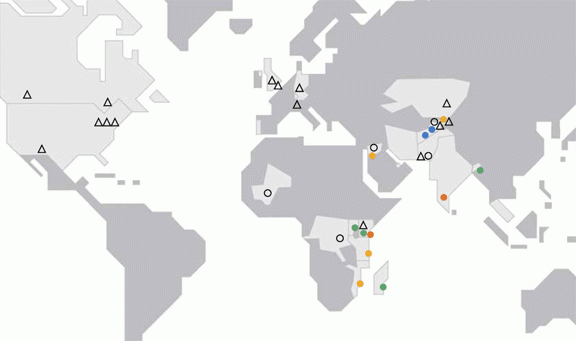
The Academies Network
The Aga Khan Academy Hyderabad is the second in a network of Aga Khan Academies being established in countries across Africa, South and Central Asia, and the Middle East. The first Academy opened in Mombasa, Kenya in 2003 and the third in Maputo, Mozambique in 2013.
The aim of the Academies is to develop future leaders with the skills and knowledge to support positive development in their societies. We achieve this by recruiting exceptional young people from all backgrounds and providing them with the highest international standard of education.
Admission is competitive and based on student merit, regardless of a family’s ability to pay. Each Academy endeavours to meet the demonstrated financial need of each admitted student.
When complete, the network of Academies will form a global learning community of approximately 18 schools in 14 countries (map). They will eventually serve approximately 14,000 girls and boys of exceptional calibre, graduating 1,500 students annually.
For more information, visit our Academies network home page.
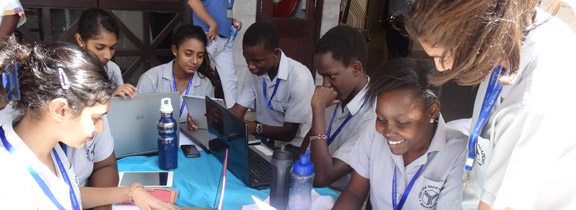
The AKA Learner Profile
The Aga Khan Academies (AKA) have developed a curriculum within the framework of the International Baccalaureate’s (IB) programmes. As such, the attributes of our learner profile are closely aligned to those of the IB learner profile.
Aga Khan Academies learners strive to be:
|
Inquirers |
We nurture our curiosity, developing skills for inquiry and research. We know how to learn independently and with others. We learn with enthusiasm and sustain our love of learning throughout life.
|
|
Knowledgeable
|
We develop and use conceptual understanding, exploring knowledge across a range of disciplines. We engage with issues and ideas that have local and global significance.
|
|
Thinkers |
We use critical and creative thinking skills to analyse and take responsible action on complex problems. We exercise initiative in making reasoned, ethical decisions.
|
|
Communicators
|
We express ourselves confidently and creatively in more than one language and in many ways. We collaborate effectively, listening carefully to the perspectives of other individuals and groups.
|
|
Principled
|
We act with integrity and honesty, with a strong sense of fairness and justice, and with respect for the dignity and rights of people everywhere. We take responsibility for our actions and their consequences.
|
|
Open-minded
|
We critically appreciate our own cultures and personal histories, as well as the values and traditions of others. We seek and evaluate a range of points of view, and we are willing to grow from the experience.
|
|
Caring
|
We show empathy, compassion and respect. We have a commitment to service, and we act to make a positive difference in the lives of others and in the world around us.
|
|
Courageous
|
We approach uncertainty with forethought and determination; we work independently and cooperatively to explore new ideas and innovative strategies. We are resourceful and resilient in the face of challenges and change.
|
|
Balanced |
We understand the importance of balancing different aspects of our lives – intellectual, physical, emotional and spiritual – to achieve well-being for ourselves and others. We recognise our interdependence with other people and with the world in which we live.
|
|
Reflective
|
We thoughtfully consider the world and our own ideas and experience. We work to understand our strengths and weaknesses in order to support our learning and personal development.
|
|
*Leaders |
We understand that multiple perspectives will allow us to make better decisions, and seek opportunities to work with a variety of others. We perceive and anticipate needs and problems, and are able to motivate ourselves and others to tackle problems, confidently and cooperatively.
|
|
*Stewards |
We understand the interconnectedness of communities, striving to create harmony in our environment, while considering the needs of all members. We are motivated to leave the world a better place.
|
© International Baccalaureate 2013
IB learner profile booklet
*Unique attributes of the Aga Khan Academies learner profile
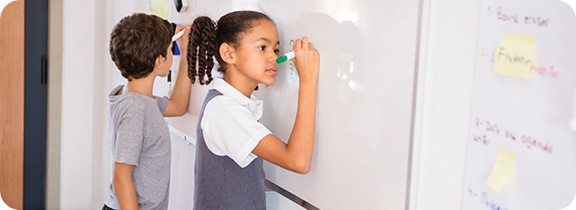
The AKA Learner Profile
The Aga Khan Academies (AKA) have developed a curriculum within the framework of the International Baccalaureate’s (IB) programmes. As such, the attributes of our learner profile are closely aligned to those of the IB learner profile.
Aga Khan Academies learners strive to be:
|
Inquirers |
We nurture our curiosity, developing skills for inquiry and research. We know how to learn independently and with others. We learn with enthusiasm and sustain our love of learning throughout life.
|
|
Knowledgeable
|
We develop and use conceptual understanding, exploring knowledge across a range of disciplines. We engage with issues and ideas that have local and global significance.
|
|
Thinkers |
We use critical and creative thinking skills to analyse and take responsible action on complex problems. We exercise initiative in making reasoned, ethical decisions.
|
|
Communicators
|
We express ourselves confidently and creatively in more than one language and in many ways. We collaborate effectively, listening carefully to the perspectives of other individuals and groups.
|
|
Principled
|
We act with integrity and honesty, with a strong sense of fairness and justice, and with respect for the dignity and rights of people everywhere. We take responsibility for our actions and their consequences.
|
|
Open-minded
|
We critically appreciate our own cultures and personal histories, as well as the values and traditions of others. We seek and evaluate a range of points of view, and we are willing to grow from the experience.
|
|
Caring
|
We show empathy, compassion and respect. We have a commitment to service, and we act to make a positive difference in the lives of others and in the world around us.
|
|
Courageous
|
We approach uncertainty with forethought and determination; we work independently and cooperatively to explore new ideas and innovative strategies. We are resourceful and resilient in the face of challenges and change.
|
|
Balanced |
We understand the importance of balancing different aspects of our lives – intellectual, physical, emotional and spiritual – to achieve well-being for ourselves and others. We recognise our interdependence with other people and with the world in which we live.
|
|
Reflective
|
We thoughtfully consider the world and our own ideas and experience. We work to understand our strengths and weaknesses in order to support our learning and personal development.
|
|
*Leaders |
We understand that multiple perspectives will allow us to make better decisions, and seek opportunities to work with a variety of others. We perceive and anticipate needs and problems, and are able to motivate ourselves and others to tackle problems, confidently and cooperatively.
|
|
*Stewards |
We understand the interconnectedness of communities, striving to create harmony in our environment, while considering the needs of all members. We are motivated to leave the world a better place.
|
© International Baccalaureate 2013
IB learner profile booklet
*Unique attributes of the Aga Khan Academies learner profile
Jemin Patel (Class of 2018): A journey of hard work, passion and striving for excellence
Jemin Patel’s journey to where he is now is the result of hard work and passion, values he picked up during his time at the Aga Khan Academy Hyderabad. Yet his story started sometime before this, when he was selected to attend the large, 100-acre Academy through a full scholarship.
Starting in the Academy as a Grade 8 student, Jemin felt all the nervousness of moving to a new place and starting at a new school. He felt out of place, not knowing whether he would succeed. Although he knew this would be difficult, he embraced the notion of working hard, instead of working smarter.
“I’ve learnt that hard work always wins,” he said. “People say, ‘work smart, not hard’. I could not disagree more. Working smart makes you efficient, whereas working hard with a focused mindset makes you a high performer.”
Although it has been five years since he graduated, Jemin continues to visit the Academy to coach and interact with students. He expressed how he felt like a big brother passing on the torch and imparting wisdom he would have loved to have during his time at the Academy. During his most recent visit, Jemin met the founder of the newly formed SAGE (Sexuality and Gender Expression) club at the Academy and felt so proud of the students.
Now, working at one of Canada’s top accounting and consulting firms, Ernst & Young, specialising in audit and assurance services, Jemin still stands by the notion, “hard work always wins.”
“It’s not about perfection, it’s about striving for excellence,” he said. “Putting in a focused and genuine effort into everything you do is all that matters.”
Interview conducted by DP2 student Samhitha Paruchuri from the Aga Khan Academy Hyderabad.
PYP Exhibition
Support our Year 5 students at the Junior School as they present on Friday 06 May.
Alumni
Education at its best facilitates positive growth in all domains – intellectual, social, physical, ethical and spiritual – leading to the well-rounded development of the child. The Aga Khan Academies aim toward this ideal, and the values they espouse are reflected in each school’s aspirations for its students.
The vision for Aga Khan Academy graduates
Students at an Academy pursue a well-balanced education combining intellectual inquiry, academic excellence, sporting and cultural activities, and a grounding in ethics and moral reasoning.
They are committed to rigour and self-discipline in their studies and subscribe to the principles of intellectual honesty in the preparation of their work.
Read more here.
The Aga Khan Academy Alumni Network
Fill out the AKA Alumni online questionnaire here
Connect with us via our Facebook and Instagram pages.
Interested to know more about our graduates? See spotlights on our alumni
Cinzia Torriani: The budding environmental activist
Growing up on Funzi Island, a settlement in Kenya, Cinzia Torriani, a Diploma Programme 1 student at the Aga Khan Academy Mombasa, has seen the impact climate change can have on the environment and the people within it.
“I saw the aquatic life in the bay that surrounded a part of the island deteriorate over time,” Cinzia said. “Fish disappeared from the easy view of the waters, dolphins, which would appear annually, stopped appearing, and I would even hear stories of animals that were once habitants of the bay as now a distant memory. Contrary to this, the number of fishermen stayed the same, and at some point, every small fish in the ocean was being caught to feed a fisherman’s family. I realised that a majority of the motives put in place on the island for helping the environment served little purpose towards establishing a feasible way forward to ensure locals, who depend on the ocean, would remain economically stable.”
By seeing this and her parents’ personal initiatives toward the environment, Cinzia channeled her energy into becoming an environmental activist, focusing on ways to better her environment while also keeping in mind the local community.
“My goal is to ensure sustainable economic and ecological development to consider both my love for my surroundings, but also the community,” Cinizia said.
Taking action
One of the first initiatives Cinzia made in relation to her goal happened a year ago during her Year 10 personal project, which allows students to collaborate with individuals in their local community to address an issue or challenge. Cinzia created an integrated farming system combining a fish farm, chicken farm and maize farm in a self-sufficient cycle. Through this system, human efficiency would be maximised; the harvest timeline would be effectively eradicated; and locals would be provided with an alternative and more productive way to get fish from the ocean.
“I was able to build this system and present it to the locals in my community while also further spreading the word about my personal project,” Cinzia said.
Following the completion of her personal project, Cinzia was able to further spread her message about the environment by speaking at the 2019 TEDxYouth event held at the Academy. In her talk, Cinzia spoke about the importance of fighting complacency in order for action to be taken toward the environment, while also discussing her personal project as a way of implementing a new agricultural system.
“This was one of the most thrilling and greatest memories I hold,” Cinzia said. “I was able to use my voice as a way to spread my opinions and ideas on what mattered to me to a group of people who were interested in listening. From this, my story was published in one of the nation’s newspapers, Business Daily, about my project, my TEDx talk and my future goals. This provided me with the opportunity to convey my message about environmental sustainability to a larger audience.”
During this academic year, Cinzia has taken steps to further her goal and spread awareness about the environment. This was seen during the Academy’s annual Peace Summit, which is a two-day event bringing together students from the Academy and around Mombasa to discuss peace and conflict resolution. The theme for this year’s Summit was “Climate Action for Peace” with Cinzia being selected as the female student lead for the event.
“The aim of the Summit was to take students through several thought-provoking and interactive activities to question their stand as activists for peace, linking this directly to the environment’s state,” Cinzia said. “From discussions on the dangers of rising sea levels, to water scarcity, to the impacts of desertification and drought, the students promoted the value of being environmentally conscious and reflecting on the actions of mankind.”
Another way Cinzia was able to spread awareness about the environment was through community service. As part of the International Baccalaureate, Diploma Programme students have to create a community service group or be a part of an existing one. For Cinzia, she saw this as an opportunity to reconnect with the local community and spread awareness.
“My friend and I created a community service project at the Academy called iSEAyou,” Cinzia said. “Our current goals include making use of polluted materials to create purchasable furniture and art, as well as promoting sustainable environmental development without any implications on the economic standards of members of society through creating and building projects, such as those I proposed in my personal project.”
Looking forward
As Cinzia continues to decide what she wants to study when she goes to university, she said she will always be an environmental activist wherever she goes. and is forever grateful for those who have guided her to get to where she is.
“I feel that no matter what career path I go into, it has become a hobby and a joy to raise awareness on the environment and work towards more environmentally-friendly systems in society,” Cinzia said.
For Cinzia, being an environmental activist doesn’t mean dedicating your entire life to the environment. She said anyone can be an advocate for the environment through various, simple ways.
“Personally I feel that simply having the strive to make a difference completely changes the path for society in order to reach end goals,” Cinzia said. “I feel that students at the Academy should work towards becoming more environmentally-conscious throughout their day-to-day lives to take little actions that make a great difference. Involvement in different initiatives taking place at the Academy also helps grow one’s character, and I feel that this is a prospect that should not be missed. I would actively encourage students to join these different teams and groups and work towards the betterment of the planet.”
Reflecting on the time she has spent so far at the Academy, Cinzia said she appreciates the supportive and nurturing environment at the Academy, which has opened many doors of opportunity for her. She said she is also grateful for her friends and family who have guided her and stood by her side throughout this all.
“The Aga Khan Academy Mombasa has instilled lifelong ethical values in me,” Cinzia said. “Through this education, I have gained a great awareness on the importance of continuously considering my environment and my community in decision-making. The values of giving back to your community and the opportunities provided by the Academy to do so are endless and truly incredible. My teachers at the Academy were one of my anchors of support as they continuously encouraged me to reach my goals and push harder. I cannot give enough gratitude to Mrs. Susan Abuto who, as the head of the Individuals and Societies department, has guided me throughout this journey, especially in spearheading this academic year’s Peace Summit. I also would not have been able to reach many of my goals without the support of my friends, family and special people in my life who stood by my side throughout this long process.”
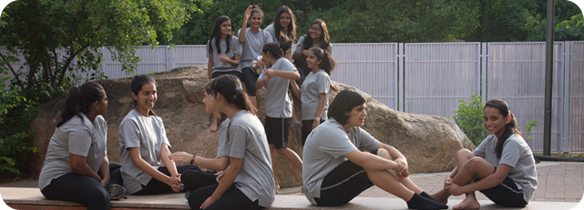
Residential Facilities
Our school culture is based on respect, integrity, honesty, fairness, empathy and good humour; and these values permeate the ethos of residential life.
The residential environment is warm and supportive, and this is reflected in the peaceful and inviting architecture of the residences. Boys and girls live in separate student residences, and all students are closely supervised by faculty and staff.
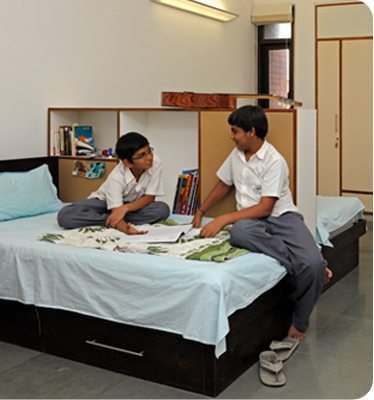 The adjustment to living away from home for the first time can be difficult for students. Our dorm parents are a carefully chosen group of teachers who live in faculty apartments in the residences. They ensure a safe, nurturing and fun-filled environment for students.
The adjustment to living away from home for the first time can be difficult for students. Our dorm parents are a carefully chosen group of teachers who live in faculty apartments in the residences. They ensure a safe, nurturing and fun-filled environment for students.
Dorm parents are trained in critical skills such as health and safety, community life and interpersonal relations. They possess a high level of energy to handle multiple tasks while offering guidance and support to the students.
We provide accommodation for members of the Academy community from both within the country and overseas, as well as those visiting or on exchange from another Aga Khan Academy.
Additional teachers' quarters on campus house resident faculty along with their families.
